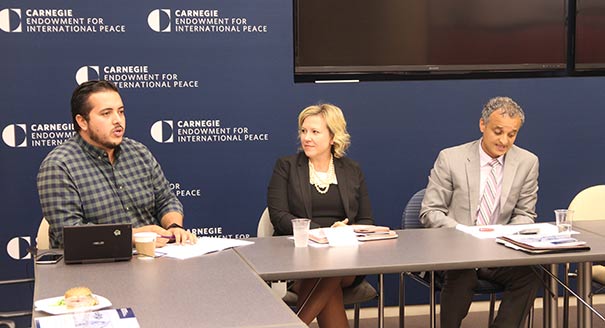Registration
You will receive an email confirming your registration.
To launch a new paper by Carnegie nonresident scholar Anouar Boukhars, Carnegie’s Sarah Yerkes moderated a discussion between Boukhars and Aymen Abderahmen, a Tunisian human rights activist and journalist who is currently an Atlas Corps fellow serving at the Tahrir Institute for Middle East Policy.
In the paper, Boukhars seeks to understand and address the drivers of conflict in Tunisia’s border regions. In the discussion, Boukhars refuted the notion that the borders regions cause conflicts because they are hotbeds of smuggling and militarism. In reality, stated Boukhars, lack of development and marginalization by the centralized government in Tunis have created intense resentment within the border regions. The Tunisian government’s efforts to address the informal economy that has emerged in response to the lack of infrastructure has negatively affected the poorest and most vulnerable people on the border regions, individuals who depend on underground cross border trade with Libya for the essentials of life. The state unresponsiveness to the needs of the regions breeds distrust and antagonism towards state authorities and security systems, and creates an environment fertile for extremist recruitment. The consequent counter-terrorism efforts by the government ensnares the state and border regions in a vicious cycle of violence.
Boukhars recommended the Tunisian government move away from their security first approach to begin seriously tackling the factors that create insecurity. Abderahmen echoed Boukhars’ position that the Tunisian state is responsible for growing militancy. Speaking as a member of the Tunisian youth, he expressed frustration with the slowness of change in Tunisia, citing the desperation of his peers who had taken to the streets during the revolution, but had seen little in the way of perceived progress.
